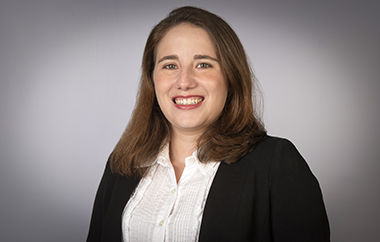PhD in Law
Current position: Course Director in the field of Environmental Law at the Academy of European Law ERA, Research Associate at the United Nations University FLORES, Supervisor of Master Thesis at the Maastricht Sustainability Institute
Research focus: international environmental law, legislative, private, and corporate initiatives to reduce plastic pollution in the oceans, fundamental rights and duties (human rights)
Luísa’s analysis of eleven existing instruments and protocols shows that none is specifically addressing the problem. But it points to several essential aspects to be considered when designing a sustainable solution to face the plastic pollution in international waters. Furthermore, she is looking at private initiatives (e.g., from NGOs and companies under the aspect of corporate social responsibility) dealing with plastic pollution. She aims at deriving principles for an appropriate policy mix, an optimal theoretical structure for environmental solutions and the interactions between government, civil society, and corporations concerning effective environmental regulation in the international context.
CV as submitted for the Green Talents award (2019):
Vitória College of Law (FDV), Brazil and Maastricht University, the Netherlands
Research focus: international environmental law, legislative, private, and corporate initiatives to reduce plastic pollution in the oceans, fundamental rights and duties (human rights)
Pollution of the oceans with all kinds of plastic is a huge and ever increasing global problem. Research is necessary in several fields to find joint solutions. Luísa started her work by looking at this complex issue from the perspective of jurisprudence. Academic literature shows that classical regulations are often not sufficient to solve international environmental problems. For this reason, the necessity of implementing a variety of different norms is being justified by many experts. Luísa’s research aims at finding a comprehensive answer to the question of how to construct a combination of private pathways and public international regulation, to incentivise a more sustainable behaviour and effectively face the problem of plastic pollution in the oceans.
Luísa analysed twelve existing instruments and protocols – from hard and soft law. Her analysis shows that none is specifically addressing the problem, but it points to several essential aspects to be considered when designing a sustainable solution to face the plastic pollution in international waters. Furthermore, she is looking at private initiatives (such as from NGOs) and companies dealing with plastic pollution. In regard to the latter she focuses on aspect of corporate social responsibility. She aims to derive principles for an appropriate policy mix, an optimal theoretical structure for environmental solutions, and the interactions between government, civil society, and corporations concerning effective environmental regulation.
Luísa’s expertise is twofold: She holds degrees in both physics and in law. She was moreover Brazilian Head Delegate at G20 Youth Summit in Sidney, Brazilian Delegate at IMF, the World Bank Spring Meetings in Washington/DC, and at the World Summit in Brazil.
Profound legal expertise is desperately needed in dealing with international environmental problems such as plastic pollution of the oceans. Because of this and her international engagement as volunteer and consultant the jury voted for Luísa to become a Green Talent awardee.






